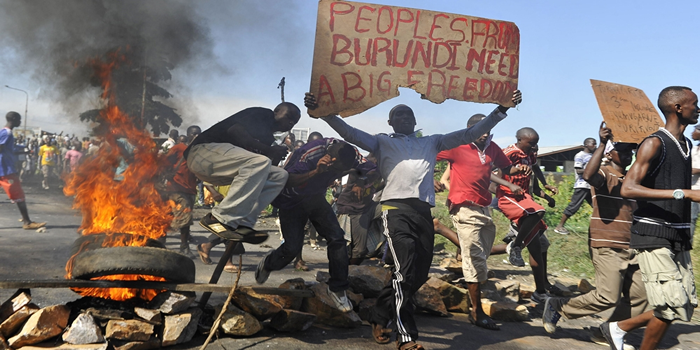A genocide could be happening in Burundi as the world turns the other way. This is according to the International Federation for Human Rights (FIDH) and Ligue ITEKA -International Refugee Rights Initiative.
“There are serious human rights violations in Burundi, mainly perpetrated by defence and security forces, against a background of ethnic and genocidal ideology. The ongoing crimes could already be qualified as crimes against humanity and there are now signs that the crisis could lead to acts of genocide, said the organisations in a report done after a fact finding mission in Burundi in March.
The organisations say the crisis demands a strong response from the UN, notably through the deployment of a UN police and an international commission of inquiry to prevent mass atrocities.
According to reports 700 people have allegedly been killed since April 2015, 4,300 have been arbitrarily detained, and several hundred people (800 according to some sources) have been forcibly disappeared.
Hundreds of other people have been tortured and dozens of women have been sexually assaulted. As a result of the conflict in Burundi, more than 250,000 Burundians have already fled the country.
An awaited action plan by United Nations (UN) Secretary-General Ban Ki Moon is yet to be released. The two organisations say the international community should act fast.
FIDH says it has documented and established the continuation of targeted and extra-judicial killings; of daily arbitrary arrests and detention; of the intensification of enforced disappearances and illegal detention facilities as well as torture. FIDH also witnessed the high level of surveillance and control on Burundian society by security forces, including by the National Intelligence Service (NIS) and by the ruling party’s youth militias, the Imbunerakure.
“The evidence gathered we have establishes that the Tustis are particularly targeted by the violence and due to their ethnicity. They are more targeted during arrests, are subject to ethnic insults from security forces and systematically tortured during detention. The public and private messages of members of the ruling party CNDD-FDD or regime supporters are referring to Tutsis more and more openly as “enemies, “terrorists” and “genocidal insurrection” . Since the assassination on 22 March 2016, of Lieutenant-colonel Darius Ikurakure , pillar of Burundi’s repressive system, targeted killings of soldiers belonging to the former Burundian Armed Forces – FAB (mainly composed of Tutsis) – have also increased.
According to information gathered by the two organisations, more than 10 former Burundian army soldiers have been killed by unidentified men since the beginning of March. These elements are part of a larger context marked by an increasingly ethnic discourse by Burundian authorities and their supporters.
In their statement, the organisations give examples of incitement to tribal violence. The day before the funeral of the Lieutenant-Colonel Darius Ikurakure, messages were circulated on social media, including the following: “Dear HUTUS, wake up! Tomorrow we will bury another hero of the anti-Tutsi struggle, his excellency Lieutenant General Darius Ikurakure. Hutu officers and civilians will attend to thank him for his work. Come in number, and be careful and remember that he hero must not die alone, za mujeri sindumja muzincunge bibaye ngombwa mukore. (watch those emaciated dogs, I am not a slave, if you must: work]. A word to the wise is enough! KORA [work]”.
The term to “work”, was used in Rwanda by the Hutu genocidal government to call upon the elimination of Tutsis. It was also used on 1 November 2015, by Burundian Senate President, Révérien Ndikuriyo, in front of his supporters and several Imbunerakure: “if you hear the signal with an order that it must end, emotions and tears will have no place !” and added “you must spray, you must exterminate those people (…) Wait for the day when we will say “work.”, you will see the difference!”.
The two organisations say that the Burundian security forces involved in the repression are themselves made up of men who know how to execute orders and can “get things done,” according to a source close to the security services.
“In response to the abuses of the regime, many men are joining the ranks of rebel armed groups (Red Tabara and Republican Forces of Burundi). These groups have carried out targeted attacks and killings against representatives of The National Council for the Defense of Democracy–Forces for the Defense of Democracy (CNDD-FDD), members of law enforcement and Imbonerakure in Bujumbura and in the provinces, which have resulted in civilian casualties.. Indiscriminate attacks against civilians may amount to war crimes and perpetrators must face justice,” they say.
Documentation of violations has become dangerous.
“Human rights defenders, opponents and independent journalists still in Burundi are living mostly underground. They are followed and receive death threats. Almost every civil society leader, journalists and opposition member have been forced to flee the country and those who remain, leaders or activists, continue to be subjected to threats or even attacks by men suspected of acting on the behalf of the regime,” say the rights organisations.







